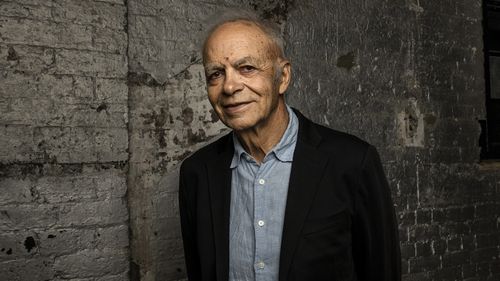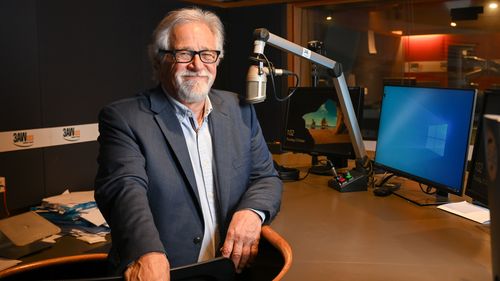A world-leading philosopher is urging that Australia change the law to allow people suffering dementia access to voluntary euthanasia.
He says assisted dying should be legal provided the patient has requested it while intellectually capable, and that the refusal to permit it is a “weakness” in the legislation.
In an interview on my podcast Neil Mitchell asks Why? Professor Peter Singer, a groundbreaking campaigner for animal rights, has also raised the possibility of medical experimentation on people who are brain dead and reasserted his belief that parents should have the right to take the life of their seriously disabled child.
But it is the dementia issue that will resonate because it touches more than two million lives in this country, including carers and families.
Dementia is already the second largest killer of Australians and growing.
It is estimated one person in the world is diagnosed every three seconds.
There are more than 55 million cases around the world and in this country, 421,000 people are living with dementia and 1.6 million people are caring for them.
Should Australia allow dementia sufferers to access voluntary euthanasia?
Singer points to a decision at the end of October by the Canadian province Quebec, which introduced euthanasia for dementia and what it terms “advance request for medical aid in dying”.
But he agrees there is a complex dilemma about euthanising such patients.
True, before becoming ill they may sign a document approving their own death when in late-stage dementia.
But an underlying principle of existing laws is that the person planning euthanasia can change their mind at the very last second.

By definition, once the path was set, a dementia patient would be incapable of changing their mind because they could not be expected to understand or communicate the decision.
That enters dangerous territory.
A person other than the one about to die would be making a decision to end the life, albeit with pre-approval perhaps dating back years.
Then, is euthanasia still voluntary, or has it become enforced by a third party?
Singer, often quoted as the most influential philosopher alive, has a personal link to the debate.
His mother died from dementia.
“I do support voluntary euthanasia and I’m glad we now have that legal in all Australian states,” he said.
“As far as applying it to people with dementia, the difference between people with dementia and people born with a profound intellectual disability, is that people with dementia can express their wishes about this in advance.
“I do see that as a weakness in our present assisted dying legislation.”
As with much he raises, the idea seems designed to provoke debate.
“There’s an interesting question as to who should make that decision,” Singer said.
“Suppose I now sign a document saying if I’m ever so demented that I cannot recognise anybody, not even my wife or children… you know, I would rather die.
“And suppose I get to the stage where I can’t but I’m not actually in severe pain, I’m just sort of lying there pretty vacantly on a bed.
“Should I have the right to make the decision (in advance) for the being who is going to be there? I think in that case I really should.
“I don’t want to end that way and I think because I’m aware and thoughtful (when giving approval) that my views carry more weight than the views of someone who is demented.”
The Canadian system requires a patient to describe in detail when competent at what stage they expect to find the symptoms of their condition intolerable.

One or two people, described as “a trusted third person”, then carry responsibility for advising the doctors that the patient, now incapable of expressing their wishes, is ready to die.
Asked for reaction, the CEO of Dementia Australia, Professor Tanya Buchanan, said there was a range of views on the issue amongst people living with dementia, their families and carers.
“As the peak advocacy body for people impacted by dementia, Dementia Australia reflects the diversity neither supporting nor rejecting the concept of voluntary assisted dying,” she said.
“What we do advocate for is choice and engagement with people impacted by dementia to understand how to best empower them to make decisions about their life and death.”
Singer addresses the dementia dilemma and other controversial ideas in an interview about his new book Animal LIberation Now, a sequel to one he wrote 50 years ago arguing for better animal rights.
He also suggests medical experiments could be carried out on people who are brain dead but technically alive and again argues the case for euthanising severely disabled babies.
“I’m still of the view that parents should have that option in particularly severe cases of disability where children are born with these conditions,” he said.
“There is actually one country that allows this to happen now and openly and that is the Netherlands.
“They did recognise there are some cases where the prospects for the child are so hopeless and the child is also suffering.
“This is not an unconscious child.
“This is a child that is feeling pain but with no prospect of really recovering.”
Singer also raised the possibility of brain dead people being used for medical experimentation and said he would be willing to be used in such a way.
“If what you’re talking about really is alive but unconscious and has no chance of recovering consciousness… in that case maybe with prior consent,” he said.
“Just like I may say on my driver’s licence that if I’m ever brain dead I don’t mind my kidneys or heart being taken.
“I might say if ever I’m in a state where there’s no chance that I could ever recover consciousness I would not mind being used for experimentation for some time.
“I make this case to meet the argument that the reason we’re justified in experimenting on animals is because we are so much more intelligent and rational than they are.
“My response is, well, does that mean if you had a human being who is so profoundly intellectually disabled they were not more intelligent than a dog or monkey or other animal being used for experiments that you would be prepared to use them?
“I’m really saying this with the expectation the answer is no.”
Neil Mitchell is a Nine news analyst. His weekly podcast editorials are posted each Thursday and his weekly interviews each Tuesday.







